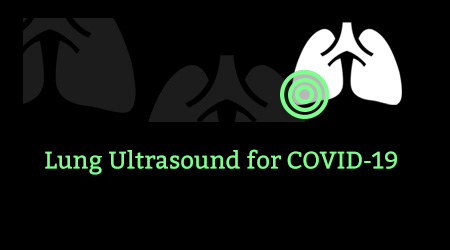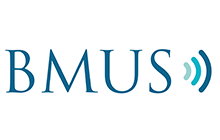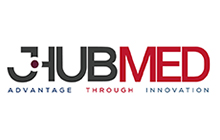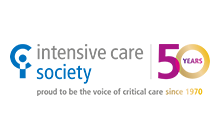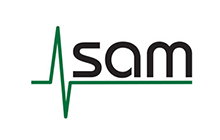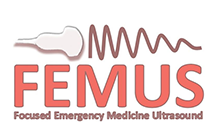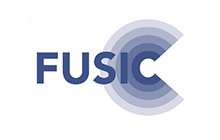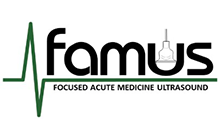About the Lung Ultrasound for COVID-19 programme
Point of care ultrasound (PoCUS) is being used nationally and internationally in the management of patients with COVID-19. Ultrasound is having, and will continue to have, a significant impact on the care of patients who have COVID-19 during this pandemic and has potential to spare patients unnecessary radiation and transfers. Lung ultrasound (LUS) can be learnt rapidly, is quick to deliver and helps aid management decisions throughout the patient pathway: from triage through to critical care admission and need for mechanical ventilation.
This elearning package contains training resources aimed at two specific applications of LUS in patients with suspected or confirmed COVID-19:
- Early triage: LUS at triage can be used in conjunction with a clinical judgement of pre-test probability to cohort patients. Such process allows affected and non-affected patients to be allocated to suitable clinical areas with a higher degree of certainty.
- Management of the ventilated patient: main use is to inform management decisions regarding pronation and lung recruitment manoeuvres.
These are consistent with recommendations of the Society for Acute Medicine and the Intensive Care Society and their associated point of care ultrasound training committees FAMUS and FUSIC (respectively).
This elearning package is aimed primarily at doctors and allied healthcare professionals working in emergency, acute and intensive care settings. Its purpose is to aid study of LUS by creating one platform where LUS for COVID-19 (LUC-19) elearning and protocols can be accessed. Local supervision from appropriately trained and skilled clinicians will be required – completion of this elearning does not denote competence in LUS. This resource does not seek to replace formal training delivered within PoCUS training programmes like Focused Ultrasound in Intensive Care (FUSIC) and Focused Acute Medicine Ultrasound (FAMUS).
More information
The British Medical Ultrasound Society (BMUS) acknowledges that “Lung ultrasonography has been noted to have results that are similar to chest CT and superior to standard chest radiography for evaluation of pneumonia/pneumonitis and/or adult respiratory distress syndrome (ARDS) with the added advantage of ease of use at point of care, repeatability and absence of radiation exposure. Anecdotal evidence from those who are working in units with multiple patients with COVID-19 have indicated that imaging may be more useful for problem solving i.e. “looking for alternative diagnoses for chest symptoms such as pleural effusion.”
Delivered by appropriately trained clinicians LUS may help reduce the need and, therefore, inherent risks associated with transporting critically ill patients with COVID-19 for further imaging. Ultrasound equipment is relatively easy to disinfect compared to other imaging modalities.
This is an elearning and pooled resource platform to aid clinicians in gaining certification in lung ultrasound for use in COVID-19. It is out with the scope of this resource to offer a national training programme as this relies on local/distance mentoring, supervision and governance. However, given the benefits of this skill for patients within the context of a pandemic, local training pathways can be created as exampled within the introduction overview document of this elearning package, with further examples of pathways which have been implemented at local trust levels in the resources section.
You can share your progress on this programme with your local mentor by selecting the Reporting Permissions page, in the My Account menu, and adding their elfh username.
As a supervisor, once trainees have provided you with Reporting Permission you can:
1. See a list of trainees you can report on
2. Run reports on their progress
Meet the team
- Adrian Lim – Radiologist, Imperial College Healthcare NHS Trust, BMUS Honorary Secretary
- Adrian Wong – ICU Consultant, King’s College Hospital NHS Foundation Trust, FUSIC Committee Member
- Anna Colclough – Emergency Medicine Consultant, Lewisham and Greenwich NHS Trust
- Ashley Miller – Anaesthesia/ICM Consultant, Shrewsbury and Telford Hospital NHS Trust, FUSIC Co-Chair
- Ben McDougall – Sonography Project Manager, Health Education England
- Bob Jarman – Emergency Medicine Consultant, Royal Victoria Infirmary, Newcastle upon Tyne Hospitals NHS Foundation Trust & Visiting Professor at Teesside University, Chair of the College of Emergency Medicine Ultrasound Subcommittee
- Catherine Kirkpatrick – Consultant Sonographer, United Lincolnshire Hospitals NHS Trust, BMUS Professional Development Officer
- Cian McDermott – Director of Emergency Ultrasound Education & Emergency Medicine Consultant, The Mater Misericordiae University Hospital-FICE mentor
- Emma Tucker – Development Manager, BMUS Development Officer
- Georgie Blenkinsop – Radiology Registrar, Ministry of Defence, JHubMed Fellow
- Hannah Conway – Advanced Critical Care Practitioner, Glenfield Hospital, University Hospitals of Leicester NHS Trust, FICE Committee Member
- Heather Venables – Senior Lecturer, University of Derby, CASE Vice President
- Helene Matte – Emergency Department Clinical Fellow, Oxford University Hospitals, Teaching Associate – Green Templeton College, University of Oxford, PoCUS Level 1/2 Instructor
- Jennie Stephens – Acute and Intensive Care Medicine Consultant, Royal Cornwall Hospitals NHS Trust, FUSIC Committee Member
- Marcus Peck – Anaesthesia/ICM Consultant, Frimley Park Hospital, Frimley Health NHS Foundation Trust, FUSIC Co-Chair
- Michael Trauer – Emergency Medicine Consultant, St Thomas’ Hospital, Guy’s and St Thomas’ NHS Foundation Trust
- Nick Mani – Speciality Registrar Emergency Medicine, Sheffield Teaching Hospitals NHS Foundation Trust & Senior Clinical Fellow in Point of Care Ultrasound, Leeds Teaching Hospitals NHS Trust, FEMUS
- Nick Smallwood – Acute Medicine Consultant, Surrey and Sussex Healthcare NHS Trust, FAMUS Chair
- Pamela Parker – Consultant Sonographer, Hull University Teaching Hospitals NHS Trust, BMUS President Elect
- Richard Beese – Radiologist, Queen Elizabeth Hospital, Lewisham and Greenwich NHS Trust, BMUS Council Member
- Trevor Parker – Clinical Governance Radiographer/ MSK Sonographer, Hull University Teaching Hospitals NHS Trust
How to access
In order to access the Lung Ultrasound for COVID-19 programme, you will need an elfh account. If you do not have one, then you can register by selecting the Register button below.
To view the Lung Ultrasound for COVID-19 programme, select the View button below. If you already have an account with elfh, you will also be able to login and enrol on the programme from the View button.
Not an NHS organisation?
If you are not an NHS health or care organisation and therefore do not qualify for free access elfh Hub, you may be able to access the service by creating an OpenAthens account.
To check whether or not you qualify for free access via OpenAthens, you can view the eligibility criteria and register on the ‘OpenAthens’ portal.
Registering large numbers of users
If you are a HR, IT or Practice Manager and would like to register and enrol large numbers of staff within your organisation for access onto the Lung Ultrasound for COVID-19 programme, please contact elfh directly.
Organisations wishing to use their own LMS
For HR departments wanting to know more about gaining access to courses using an existing Learning Management System please contact elfh directly to express interest.
More information
Please select the following link for more information on how to use the elfh Hub.



